
Benham is a home rule-class city in Harlan County, Kentucky, in the United States. The city was formally incorporated by the General Assembly in 1961. The population was 512 at the 2020 census, up from 500 at the 2010 census.

Thurmond is a town in Fayette County, West Virginia, United States, on the New River. The population was five at the 2020 census. During the heyday of coal mining in the New River Gorge, Thurmond was a prosperous town with a number of businesses and facilities for the Chesapeake and Ohio Railway.

This is a list of sites in Minnesota which are included in the National Register of Historic Places. There are more than 1,700 properties and historic districts listed on the NRHP; each of Minnesota's 87 counties has at least 2 listings. Twenty-two sites are also National Historic Landmarks.
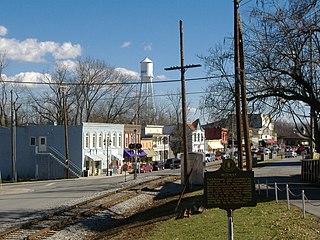
The Midway Historic District of Midway, Kentucky, was designated by the National Register of Historic Places as a historic district on November 17, 1978. In 2003, faced with a declining downtown, a major streetscape renovation project began as part of the Kentucky Main Street Program.

Constructed in 1907, the McCreary County Museum is housed in the former Stearns Coal and Lumber Company corporate headquarters in Stearns, Kentucky. The building served as the company's office headquarters in the Southern United States, and maintains the company president's office as an exhibit. The town where the museum is located was called the Stearns Empire of the South, and the museum continues to preserve and display the area's history from the Indian and pioneer times into the town's peak at the height of the coal and lumber industry boom. The exhibits include significant coverage of Appalachian life in McCreary County, including an exhibit on moonshine.

This is a list of the National Register of Historic Places listings in McDowell County, West Virginia.
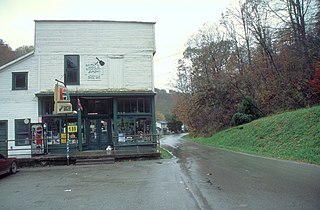
The Mine No. 5 Store is a historic department store located in Van Lear, Kentucky, United States. The two-story, wood-frame building was constructed in 1918 by Consolidated Coal Company. On January 26, 1989, the structure was added to the National Register of Historic Places.

The Kentucky Coal Museum is a heritage center located in Benham, Kentucky. Its focus is the history of the coal industry in Eastern Kentucky, featuring specific exhibits on the company towns of Benham and neighboring Lynch. It is housed in a former company store that was built by International Harvester in 1923. In June 1990, the Tri-City Chamber of Commerce purchased the building for the future site of the museum. After receiving additional grants from the state of Kentucky, the museum opened in May 1994.

Pocahontas Fuel Company Store and Office Buildings are a historic company store and an office building located at Jenkinjones, McDowell County, West Virginia. Both buildings were designed by architect Alex B. Mahood and built in 1917. They were listed on the National Register of Historic Places in 1992.
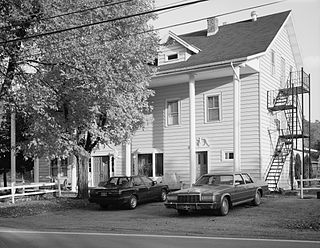
The Robertsdale Historic District is a national historic district that is located in Robertsdale in Wood Township, Huntingdon County, Pennsylvania.

Colver Historic District is a national historic district located at Barr Township and Cambria Township in Cambria County, Pennsylvania. The district includes 336 contributing buildings, 5 contributing sites, and 3 contributing structures. The district consists of residential areas, coal mining resources, Cambria and Indiana Railroad shop buildings, and a dairy farm associated with the Ebensburg Coal Company's mine and developed between 1911 and 1943. Notable buildings include a variety of brick and frame workers' housing, the Ebensburg Coal Company office building (1914), stone company store (1912), Colver Amusement Company (1912), Colver Hotel (1912), Colver Presbyterian Church (1915), public school (1927), hospital (1914), Roundhouse No. 1 (1918), Roundhouse No. 2 (1920), and main power building (1911).

Windber Historic District is a national historic district located at Paint Borough, Scalp Level, and Windber in Cambria County and Somerset County, Pennsylvania. The district includes 944 contributing buildings and 1 contributing site. It encompasses an area first developed by the Berwind-White Coal Company in 1897, and developed and between 1897 and 1930. It includes the central business district of Windber and surrounding residential areas, consisting largely of workers' housing. Notable buildings include the Berwind-White Headquarters Building (1903), Eureka Department Store (1899), Windber Trust Company (1910), Windber Electric Building (1925), Clement Building (1902), Windber Hotel (1902), former train station (1916), Arcadia Theater (1919), Clubhouse (1899), David Shaffer House, and Windber Hospital.
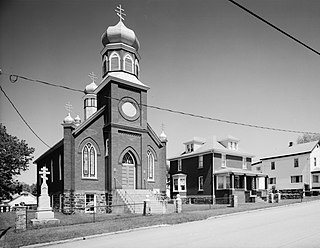
Boswell Historic District is a national historic district located at Boswell in Somerset County, Pennsylvania. The district includes 90 contributing buildings and 1 contributing site. It encompasses an area developed by the Merchant's Mining Company of Baltimore, Maryland starting in 1901. It includes the remaining extant mine resources and the archaeological remains of the mine. They consist of utilitarian industrial buildings, four types of vernacular housing, and a variety of commercial, social, and institutional buildings. Notable buildings include the First National Bank of Boswell (1919), Merchant's Coal Company office (1901), St. Stanislaus Roman Catholic Church (1918), and Sts. Peter and Paul Russian Orthodox Church (1918).

The Depot Square Historic District encompasses the historic commercial business district of Randolph, Vermont. Developed in the mid-19th century around the facilities of the Central Vermont Railway, the area features a high concentration of well-preserved Second Empire and late Victorian commercial architecture. It was listed on the National Register of Historic Places in 1975.
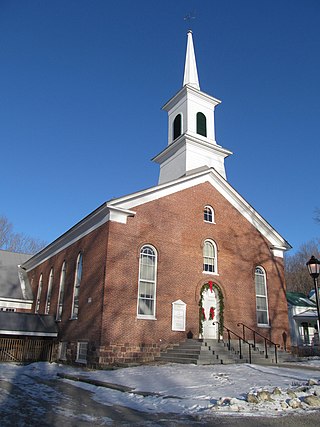
The Jericho Center Historic District encompasses much of the central village of Jericho, Vermont. Centered on the town green at the meeting point of Brown's Trace, Varney Road, and Bolger Hill Road, the center is a well-preserved Vermont country village developed mainly in the 19th and early 20th centuries. It was listed on the National Register of Historic Places in 1983.

The Pineville Courthouse Square Historic District is a 7-acre (2.8 ha) historic district in Pineville, Kentucky that is listed on the U.S. National Register of Historic Places. It includes the Bell County Courthouse and related government buildings and the central business core of the town.

The Cumberland Central Business District is a commercial historic district in downtown Cumberland, Kentucky. While Cumberland was first settled in the 1820s, the district was developed during the area's coal mining boom of the 1910s and 1920s, which came after the Louisville and Nashville Railroad built lines through the region. Two of the largest mines in Harlan County, at Benham and Lynch, were near Cumberland; Benham and Lynch were company towns, however, which made Cumberland the closest commercial center independent of the mining companies. During this period, downtown Cumberland added a bank, a theater, a bus station, and many restaurants and specialty shops. The local coal industry declined dramatically during the Great Depression, and many of Cumberland's businesses closed as mining companies and their employees left the region.

The Lynch Historic District, in Lynch, Kentucky, is a 125 acres (51 ha) historic district which was listed on the National Register of Historic Places in 2003. It included 298 contributing buildings, four contributing structures, and a contributing site.

The Middlesboro Downtown Commercial District in Middlesboro, Kentucky is a 37 acres (15 ha) historic district which was listed on the National Register of Historic Places in 1983.

The Cokedale Historic District, in Cokedale, Colorado, is a 450 acres (1.8 km2) historic district which is roughly bounded by Church, Maple, Pine, Elm, and Spruce Streets. It was listed on the National Register of Historic Places in 1985. The listing included 92 contributing buildings, seven contributing structures, and two contributing sites.






















